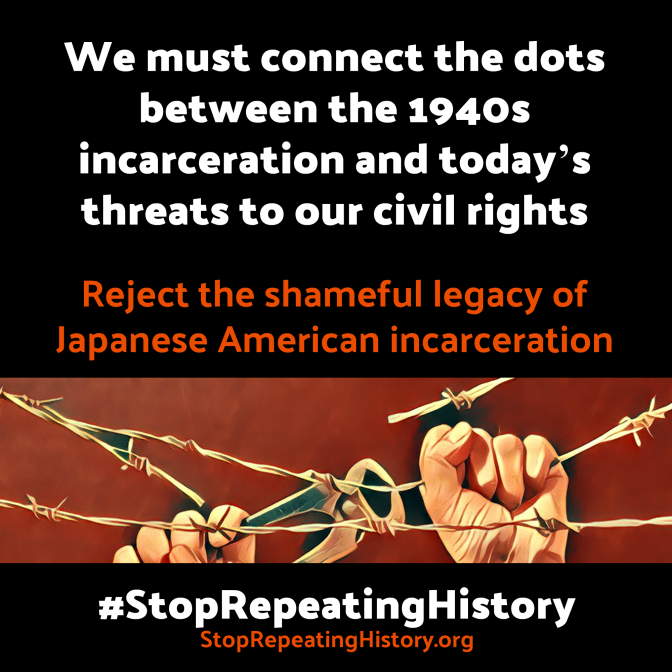[PARTNER] Hirabayashi, Yasui, Korematsu Families File Brief in Supreme Court in Opposition to Travel Ban
/SEATTLE (Sept. 18, 2017) – The children of Gordon Hirabayashi, Minoru Yasui, and Fred Korematsu today filed an amicus brief in the U.S. Supreme Court opposing Executive Order No. 13780, the Trump administration’s travel ban on nationals from six Muslim-majority nations, pointing to the unjust incarceration of Japanese Americans during WWII as an urgent warning against presidential powers run amok.
“Rather than repeat the injustices of the past,” states the brief, the Court “should heed the lessons of Korematsu, Hirabayashi, and Yasui: Blind deference to the Executive Branch … is incompatible with the protection of fundamental freedoms.”
The brief was filed on behalf of Jay Hirabayashi, Holly Yasui, and Karen Korematsu by the Fred. T. Korematsu Center for Law and Equality at Seattle University School of Law in partnership with the legal teams that gained exoneration of the three men in historic coram nobis petitions in the 1980s. Attorneys from Akin Gump Strauss Hauer & Feld LLP provided pro bono counsel.
Numerous prominent civil rights organizations stand with Hirabayashi, Yasui, and Korematsu on the brief, including Asian Americans Advancing Justice, Asian American Legal Defense and Education Fund, Hispanic National Bar Association, Japanese American Citizens League-Honolulu Chapter, LatinoJustice PRLDEF, National Bar Association, and South Asian Bar Association of North America.
In defending the travel ban, the government asserts that “federal courts may not second-guess the political branches’ decisions.” Invoking national security, the government seeks near complete deference to the President’s decision to deny visas and suspend the entry of refugees from six Muslim-majority nations.
Today, the children of these iconic Supreme Court litigants remind the Supreme Court that during World War II, its near complete deference to the executive branch and corresponding failure to scrutinize another Executive Order ̶ Presidential Executive Order 9066 ̶ resulted in upholding the constitutionality of 120,000 Americans being forcibly incarcerated because of their racial ancestry, a decision now universally condemned as a civil liberties disaster.
By choosing not to question the executive branch, the Court essentially “rubber-stamped” the government’s bald assertion that the mass-round up was reasonable and necessary, and in doing so, abdicated its critical role in safeguarding fundamental freedoms.
In contrast, both the 9th Circuit and 4th Circuit Courts of Appeals this year ruled that it is the duty of the judiciary to hold the President accountable to the requirements of the law and the Constitution—and that unfounded claims about threats to national security cannot justify the wholesale infringement of civil liberties.
Moreover, the Hirabayashi, Yasui and Korematsu brief argues that the government’s present position that the courts should give the executive branch extreme deference is not rooted in sound constitutional tradition, but relies on previous court decisions based on racism and xenophobia.
It bears remembering that three Justices wrote scathing dissents in Korematsu v. United States, questioning the government’s claims that the mass deprivation of civil liberties was justified by military necessity, including Justice Robert H. Jackson who referred to the majority’s decision as “a loaded weapon ready for the hand of any authority who could put forth a plausible claim of an urgent need.”
Justice Jackson meant that with little more than an assertion by the government that national security demands it, an entire group could be denied their fundamental freedoms.
If the Supreme Court accepts the government’s view that the courts should abdicate their constitutional role of ensuring that the President’s actions adhere to the Constitution and the law, the Court risks repeating the injustices stemming from Hirabayashi, Yasui, and Korematsu.
Without any meaningful review by the courts of government actions, it invites overreach and the potential for abuse. In this regard, the children of Hirabayashi, Yasui and Korematsu point to the misconduct that occurred in their fathers’ challenges.
Four decades after the Supreme Court ruled against these litigants, their cases were successfully reopened on the grounds that the government deceived the Court by withholding evidence that would have exonerated not only the three men, but all the Americans who were imprisoned behind barbed wire.
The evidence included intelligence reports from the Navy, FBI, and the FCC, which categorically denied that Japanese Americans had committed any wrong or posed any threat. Other Justice Department memoranda characterized the Army’s claims that Japanese Americans were spying as “intentional falsehoods.” These official reports were never presented to the Court, having been intentionally suppressed and, in one case, destroyed by burning it.
If the Court abdicates its constitutional role of asking probing questions to determine whether there is a reasonable factual basis for the Executive Order, the executive branch could use this strategy again to achieve an equally unjust outcome.
Today, President Trump argues in court and in the news media that his Executive Order is not reviewable by any court. The Trump Administration is asking the judiciary to make the same mistake it made in the 1940s, and the Appeals Courts have wisely declined.
Media Contacts:
Donald K. Tamaki, Partner (for coram nobis teams)
Minami Tamaki LLP
415.788.2705
dtamaki@MinamiTamaki.com
Prof. Robert Chang, Executive Director
Fred T. Korematsu Center for Law and Equality, Seattle University School of Law
206. 398.4025
changro@seattleu.edu
Prof. Lorraine K. Bannai, Director
Fred T. Korematsu Center for Law and Equality, Seattle University School of Law
206.398-4009
bannail@seattleu.edu
Robert A. Johnson, Partner
Akin Gump Strauss Hauer & Feld LLP
212.872.1077
rajohnson@akingump.com


